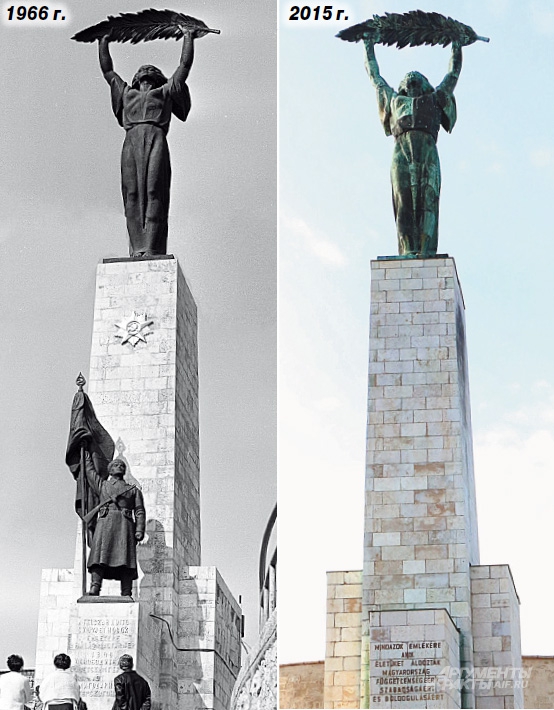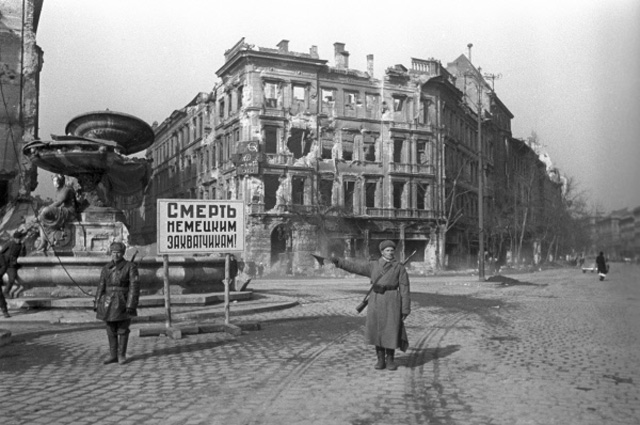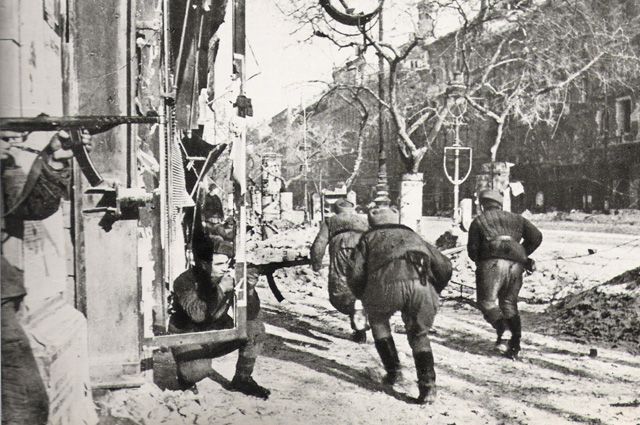Below is a translation of an article by Georgy Zotov, published in “Argumenty i Fakty” on the 13th of February 2015:
Despite the fact that Hungary joined Hitler and attacked the USSR, the position of the local historians is often the same: in 1945 the country became a “victim of Soviet tyranny.” Is this true? An “AiF” observer is trying to make sense of the situation.
In number 3 of “AiF” we published a report from Poland “The Sorrow of a Warsaw Woman” (English translation here): why Polish politicians and the media ignored the memory of Soviet soldiers who liberated Warsaw. The article caused an unprecedented surge of responses and questions from readers: how do things stand with memory in other European countries? In this regard, commemorating the 70th anniversary of Victory, “AiF” begins a series of reports from European capitals that the Red Army occupied after Warsaw: on February 13, 1945 it liberated Budapest.
Soldier with PCA was removed
– Of course, we are absolutely not like Poles – a freelance journalist Laszlo Kovacs, who in 1981-1986 studied in the USSR, politely starts the conversation. – In Hungary, there is no general negative attitude towards Russia, our Prime Minister is in favour of the construction of the “South Stream” and the cessation of the EU’s anti-Russian sanctions. However, as in the rest of Eastern Europe, our media since 1989, hammered into people’s minds the same thing, that in 1945 the evil Russians came here and brought on tips of their bayonets the communist regime. We tend to forget that in fact it was Hungary that joined Hitler and declared war on the Soviet Union and sent to the Eastern Front hundreds of thousands of soldiers – during the Battle of Stalingrad a whole Hungarian army perished there. We took the land of the neighbours in Romania, Yugoslavia, Czechoslovakia. In just one year the Hungarian police and SS together with the Germans destroyed 450,000 local Jews and 28,000 Gypsies. It’s just awful. The Red Army saved Hungarians from becoming a Nazi monsters.

Before and after: a monument to our soldiers completely anonymised. Photo: RIA Novosti, AIF / Georgy Zotov
And what is the gratitude for the salvation? Stepping carefully on the steep stairs, I climb Mount Gellert: in 1947 there was a monument to 80,000 Soviet soldiers killed in the battle for the capital of Hungary. You can see in my photos what’s left of it – a bronze figure of a soldier with the PCA has been removed, five-pointed star is removed, the names of all 146 who died in the battle for Gellert carefully erased from the marble stella – a monument was simply made impersonal. And not far from another obelisk to the soldiers of the USSR in the center of Budapest (at Freedom Square), there is even a monument to… an ally of Hitler – dictator Miklos Horthy. And even though this initiative is not coming from the government, but from the far-right party “Jobbik”, the closeness is quite disgusting.
– I want to emphasize – the installation of a bronze likeness of Horthy has caused a storm of protest in Budapest!, explains historian Istvan Hegedyush. – Yes, it should be recognized: Hungary acted badly when it comes to the monument on Gellert Hill – in the nineties the politicians were vying to portray themselves as fighters against “communist tyranny.” Hungarians then tempered… signed an agreement with the Government of the Russian Federation on the status of military graves: the graves of the soldiers are looked after, kept clean, fresh flowers are put there. Recently, we have restored the Soviet military cemetery Kerepesi Cemetery and invited relatives of soldiers buried there to visit Hungary without a visa. Hundreds of young people are involved in scouting forces, searching for the remains of the Red Army, so as to bury them with honour. But, of course, the attitude of the Hungarians to the Victory has strongly been influenced by the sense of offence, as a popular uprising in 1956 was drowned in the blood by your army. Then many viewed Russians not as liberators from Nazism, but as occupiers.

Hungary’s capital in ruins. Restoration will be done at the expense of the USSR. Photo: RIA Novosti / I. Ozersky
The revolution, suppressed on Khrushchev’s orders, cost the Hungarian people 2652 killed citizens. The war on Hitler’s side claimed the lives of 300,000 Hungarian soldiers and 600,000 civilians – 10 percent (!) Of the total population. This is not to mention the following: the Soviet Union “shelved” the facts of Hungary’s participation in punitive operations in 1941-1944 in our country. Executions of women, burnt villages, the executions of the partisans, torture of prisoners of war – tens of thousands of victims. Documents are still kept in Russian archives: take only one case among many. On May 28, 1942 Hungarian soldiers shot 350 people in the village of Svetlov in Bryansk region “for helping the partisans”. Peasant woman gave E. Vedeshina gave testimony about it, the punishers killed her four children – 11, 8, 5 and 1 year(!) old. She miraculously survived, lying in a hole under the children’s corpses. Why am I saying this? Seems like we must forgive these kinds of atrocities, but our mistakes in Eastern Europe, no one at all forgets and is still reminding us about at every step.
“There’s nothing to thank for”
It can hardly be disputed, that after the Victory, Stalin established a regime, unpleasant for most Hungarians. However, in 1945 the Soviet Union didn’t treat Hungary as a country-aggressor (which it had the rights to do): reparations were symbolic, unlike Germany, the state was not dismembered, the government of the USSR financed the rise of the capital of Hungary from the ruins in 1950-1960s, rebuilt five bridges across the Danube. Maybe these facts should be remember too along with the “tyranny”? But no. Supporters of the label of “Soviet occupation” are ill with an interesting kind of amnesia: everything that the Soviet Union did wrong, they remember very well, but what was good, is forgotten.
After 70 years, Hungary views its liberation differently than Poland, Ukraine and the Baltic States: the war with the monuments has seized, and the former SS men have no respect. Although the theme of Victory remains difficult for the local community. Hungarian Embassy in Russia, once promising to help with the interview on the topic of February 13, 1945, didn’t find a single person(!) who wanted to comment on this event, and I had to look to the interlocutors. Often we hear such opinions: “It’s enough to reproach Russian for past, but also there’s nothing to thank Russia for”. Fortunately, there are enough people with a sense of gratitude living in Hungary – the descendants of the Jews saved from the concentration camps, veterans from among thousands of Hungarian military who switched to the side of the Red Army in 1945, the participants of the anti-fascist organisations. IT will be them, who will put flowers on the graves of Soviet soldiers on the anniversary of the liberation of Budapest. Only those who wish so themselves are ill with amnesia in Eastern Europe…

